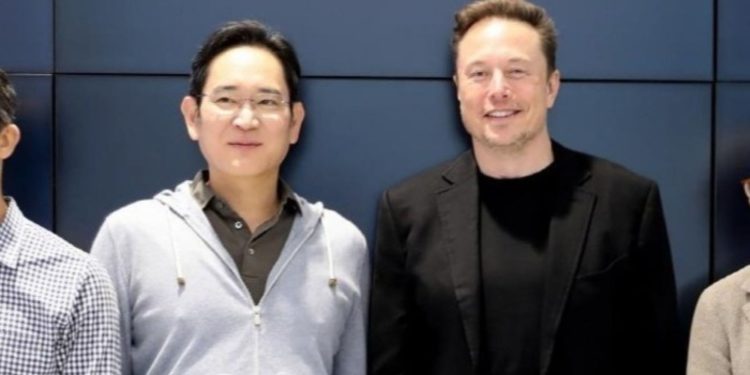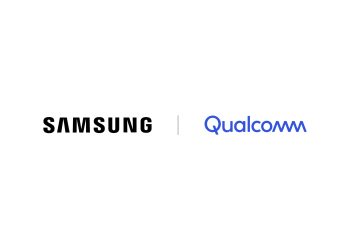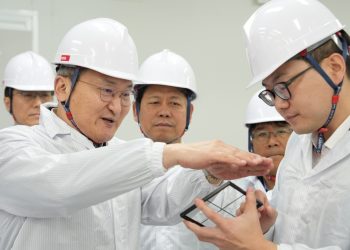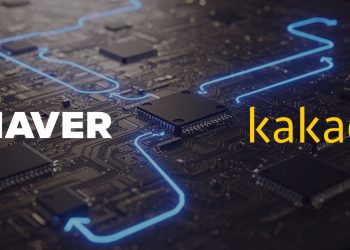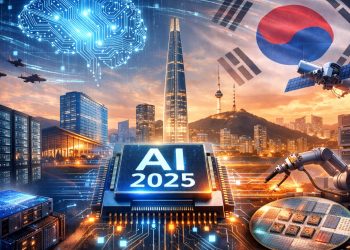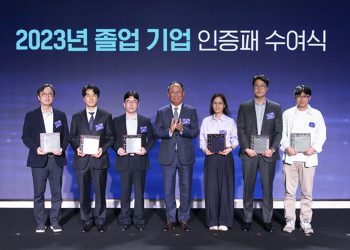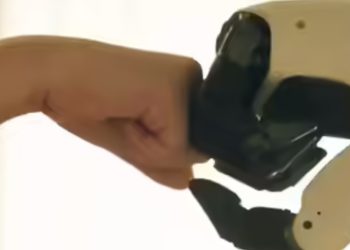Elon Musk has formally acknowledged Tesla’s multibillion-dollar chip partnership with Samsung Electronics, putting to rest speculation about the mystery client behind the South Korean firm’s blockbuster deal. On Tuesday, the Tesla chief said he had a video call with Samsung Chairman Lee Jae-yong and top executives to discuss the $16.5 billion long-term semiconductor supply contract. His public confirmation came just a day after Samsung unveiled the eight-year wafer fabrication agreement, initially without revealing the customer’s identity.
The deal will see Samsung’s upcoming Texas facility manufacture Tesla’s next-generation A16 AI processors, a move that strengthens Samsung’s position in the competitive chipmaking market.
For Tesla, the partnership secures critical semiconductor supply for its AI-driven automotive and energy ambitions, while for Samsung, the agreement injects renewed confidence into its underappreciated foundry business. Investors have already reacted positively, seeing the deal as proof that Samsung can still compete in the global high-performance chip race.
Elon Musk took to his social media platform X to personally address the details of Tesla’s landmark semiconductor deal with Samsung Electronics. Responding to a user who suggested that Samsung “had no idea what they signed up for,” Musk firmly countered, saying he had already held a video call with Chairman Lee Jae-yong and senior leadership to discuss the partnership in depth. He emphasized that the collaboration would combine the strengths of both companies to “achieve something truly great,” highlighting the strategic nature of the alliance.
The Tesla CEO also confirmed that Samsung’s new Texas foundry will serve as a dedicated facility for producing Tesla’s next-generation AI6 chips. Musk described the project’s importance as “hard to overstate” and suggested that the $16.5 billion contract represents only the baseline commitment, with actual production potentially reaching several times the initial volume. This remark has fueled market speculation that Tesla may also place future orders, including for its upcoming Dojo 2 chips designed for AI training in autonomous driving systems.
For Samsung, the Tesla agreement is a major boost to its struggling foundry business. Once considered a challenger to Taiwan’s TSMC, the South Korean company has lost significant market share in recent years, with TSMC commanding 67.6% of the global foundry market compared to Samsung’s 7.7%, according to TrendForce. The Tesla contract provides a critical vote of confidence at a time when Samsung has faced persistent underutilization of its chipmaking facilities and setbacks in its high-bandwidth memory business.
The announcement has already delivered a positive impact on investor sentiment. Samsung shares jumped more than 11% in Seoul following the news, as markets interpreted the deal as evidence of a potential turnaround for the foundry division. Analysts suggest that the partnership could add over $50 billion to Samsung’s market value if production ramps up as expected. Some investors, however, remain cautious, noting that Samsung must still demonstrate consistent execution in AI chip production before a full recovery can be declared.
Chairman Lee Jae-yong has also taken an active role in bolstering the company’s semiconductor prospects. He departed for the United States shortly after the announcement, reportedly to explore additional investment opportunities in the Texas facility and to support ongoing trade discussions aimed at mitigating potential U.S. tariffs. The Taylor, Texas, foundry, a cornerstone of Samsung’s $37 billion U.S. expansion plan, has faced construction delays but is supported by subsidies and tax incentives under the 2022 U.S. Chips and Science Act.
Market observers see the Tesla deal as both a symbolic and practical turning point for Samsung. It validates the company’s advanced manufacturing capabilities on U.S. soil and offers a path to secure long-term utilization for its new fab. Analysts like NH Investment & Securities’ Ryu Young-ho believe the agreement could expand into broader AI chip collaboration, cementing Samsung’s relevance in the next generation of autonomous and AI-driven technologies.
Despite the optimism, Samsung still faces structural challenges. Domestic rival SK Hynix recently overtook the company in DRAM production, and Samsung continues to seek validation from Nvidia for its latest high-bandwidth memory chips. While the Tesla contract provides a powerful narrative boost, industry experts caution that sustainable growth will depend on execution, market adoption, and Samsung’s ability to regain its edge in both memory and foundry businesses. Further clarity is expected when Samsung reports its quarterly earnings and shares additional details on the Tesla partnership later this week.
Image credits: Samsung Electronics

